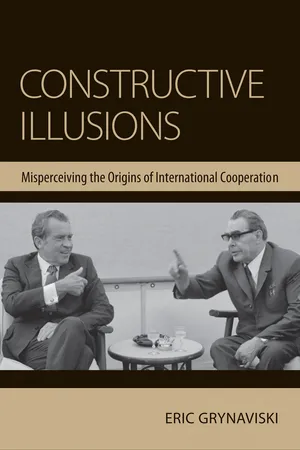
Constructive Illusions
Misperceiving the Origins of International Cooperation
- 224 pages
- English
- ePUB (mobile friendly)
- Available on iOS & Android
About This Book
Are the best international agreements products of mutual understanding? The conventional wisdom in economics, sociology, and political science is that accurate perceptions of others' interests, beliefs, and ideologies promote cooperation. Obstacles to international cooperation therefore emerge from misperception and misunderstanding. In Constructive Illusions, Eric Grynaviski challenges this conventional wisdom by arguing that when nations wrongly believe they share a mutual understanding, international cooperation is actually more likely, and more productive, than if they had a genuine understanding of each other's position.Mutual understanding can lead to breakdowns in cooperation by revealing intractable conflicts of interest, identity, and ideology. Incorrectly assuming a mutual understanding exists, in contrast, can enhance cooperation by making actors confident that collaborative ventures are in both parties' best interest and that both parties have a reliable understanding of the terms of cooperation. Grynaviski shows how such constructive misunderstandings allowed for cooperation between the United States and the Soviet Union between 1972 and 1979.During détente, the superpowers reached more than 150 agreements, established standing consultative committees, regularly held high-level summit meetings, and engaged in global crisis management. The turn from enmity to cooperation was so stark that many observers predicted a permanent end to the Cold War. Why did the superpowers move from confrontation to cooperation? Grynaviski's theory of the role of misunderstanding in cooperation provides an explanation that is significantly different from liberal institutionalist and constructivist approaches. This book's central claim is that states can form what French president Valéry Giscard d'Estaing called "a superb agreement based on complete misunderstanding."
Frequently asked questions
Information
Table of contents
- Acknowledgments
- Introduction
- 1. When Common Knowledge Is Wrong
- 2. Détente
- 3. The Anti-Ballistic Missile Treaty
- 4. The Decline of Détente
- Conclusion
- Notes
- References